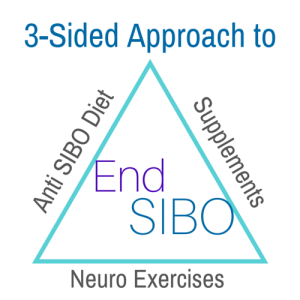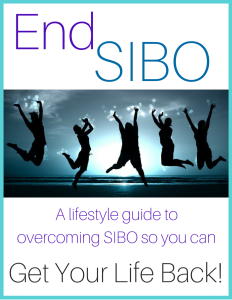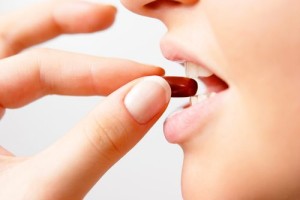SIBO (Small Intestinal Bacterial Overgrowth) is a complex condition that requires a three- sided approach in order to support and rebalance your body, giving it what it needs to heal itself:
sided approach in order to support and rebalance your body, giving it what it needs to heal itself:
- a specific diet to eliminate bloating
- neurological exercises to retrain the nerves that control your gastrointestinal tract
- SIBO-specific natural compounds to support your system
SIBO Diet
You can search and find all sorts of dietary guidelines people have used and doctors recommend to help relieve the symptoms of SIBO. But there’s a new diet that I’ve been using with my patients that is more specific than anything I’ve seen. However, it needs to be said that there is no one definitive absolute diet that works for all SIBO patients 100% of the time.
There are over 2000 bacterial species that may have taken up residence in your small intestine. And in the same way that we all like and dislike certain foods, I would imagine those bacterial species like to eat and ferment on different foods too. So since everyone has different microbiota, everyone is going to have different foods that cause their symptoms, depending on which ones their bacteria reacts to.
Also to consider is the fact that there very well may also be additional factors contributing to bloating that should be investigated. Some would include, but are not limited to, Candida overgrowth in the gut, food sensitivities, Celiac Disease, lack of enzymes, and hypochlorhydria. . .just to name a few.
 You have to eat really clean, not only to starve the bacteria, but to give your body a chance to clear out all the inflammation and mucus that has built up. Much of it is trial and error. It may take a few weeks to eliminate enough inflammation and bloating that you can actually tell which foods won’t work for you. You can tell this because once your symptoms subside, you will know right away when you eat something that ferments in your GI tract, causing your usual SIBO symptoms to reappear. Within 24 hours, your bloating, belching, gas, pain, distention, etc. will return.
You have to eat really clean, not only to starve the bacteria, but to give your body a chance to clear out all the inflammation and mucus that has built up. Much of it is trial and error. It may take a few weeks to eliminate enough inflammation and bloating that you can actually tell which foods won’t work for you. You can tell this because once your symptoms subside, you will know right away when you eat something that ferments in your GI tract, causing your usual SIBO symptoms to reappear. Within 24 hours, your bloating, belching, gas, pain, distention, etc. will return.
Sign up HERE and Dr Lisa’s free eBook will emailed to you. In there, you will find a tried and tested dietary guideline, recipes, menus, how to prepare for traveling, eating out and so much more.
Neurological Exercises
Neurological exercises are imperative in order to reestablish a good brain-gut connection and stimulate motor control of the intestines. As you know, your brain controls all functions in your body. But when there is neurological disruption, the brain may not be able to properly innervate the digestive organs or instruct them on motility (the body’s ability to mix and move food contents through the intestines).
 1) Gargle as hard as you can for as long as you can – 3 to 5 times per day
1) Gargle as hard as you can for as long as you can – 3 to 5 times per day
2) Using a tongue depressor, stimulate your gag reflex until you cough – repeat about 10 times, also 3 to 5 times per day
3) Using an enema bag or enema bucket, do water or coffee retention enemas once per day – this will hydrate and cleanse your colon, stimulate the liver to release toxins, assist in physically removing dead bacteria coming out of the small intestine, and tone the muscles that control the intestines and their movement
Supplements
 Many times, health issues resolve on their own with a change in diet alone. SIBO, however, is like a beast. And fortunately, we have come up with a combination of natural and non-toxic compounds that when used together, seem to create a very healing environment within the body of the SIBO sufferer.
Many times, health issues resolve on their own with a change in diet alone. SIBO, however, is like a beast. And fortunately, we have come up with a combination of natural and non-toxic compounds that when used together, seem to create a very healing environment within the body of the SIBO sufferer.
Although people may not be used to taking a lot of supplements, this is one time it is highly recommend in order to address all aspects. A thorough approach includes:
- Enzymes to help break down food, giving your body a break by minimizing bloating
- Herbs to create a hostile environment where bugs of all sorts really don’t like to live
- Very specific strains of probiotics that help balance out the microbiota
- Compounds to support rebuilding of the gut wall and brush border
- Boosting nutrition while gently cleansing the gastrointestinal tract
For more details on this system, see the article on SIBO-Specific Supplements.
Putting it All Together
There are multiple cycles compounding the SIBO issue, all feeding into and dependent upon each other, that need to be broken simultaneously. Here’s why:
Cycle #1 that needs to be broken
If you are lacking HCl or enzymes, you will have bloating when you eat. If you have bloating in the small intestine, the ileocecal valve will prop open and allow bacteria to translocate from your colon into your small intestine. Without eliminating the bloating, you will continue to reinfect your small intestine.
Cycle #2 that needs to be broken
Without getting rid of the bugs, you cannot stop the bloating. So you will never be able to digest your food properly. Without digestion and assimilation of nutrients, your body will not have what it needs to repair the inner intestinal lining. Without repairing the intestinal lining, you will never be able to thoroughly assimilate your nutrients.
Cycle #3 that needs to be broken
Without proper replenishment of good SIBO-friendly probiotics, your colon’s bacterial flora will be out of balance. So until you break cycle #1, the specific strains of bacteria entering your small intestine can be problematic.
If you need help figuring all of this out, have questions or simply want more information, Contact Dr Lisa, Book an Appointment or check out Dr Lisa’s End SIBO Support Package.
There is SO much hope! And as always, I like to give a disclaimer:
These statements have not been evaluated by the Food and Drug Administration. These products are not intended to diagnose, treat, cure, or prevent any disease. These suggestions are not intended to replace medical care. They are to be considered nutritional support and an adjunct to medical care.
5 Comments on How to Overcome SIBO: A Three-Sided Approach
1Pingbacks & Trackbacks on How to Overcome SIBO: A Three-Sided Approach
-
[…] enemas for SIBO is that you shouldn’t become addicted to them. On her blog, Dr. Lisa Giusiana warned one reader that there is a risk that pressure inside the colon could cause the ileocecal valve to […]

Irina
April 12, 2016 at 4:31 pm (9 years ago)I see that you mention enemas, and I understand that it relieves pain and constipation by doing that. But what I am afraid of is will the body start relying on enemas to remove waste from the body. Also a lot of doctors and naturopaths advise against enemas saying it’ll make it even worse for Sibo. I’m really confused on what I should do.
Thank you 🙂
Dr Lisa Giusiana
April 13, 2016 at 12:44 am (9 years ago)Another great question. The enemas do have multiple benefits, and are quite controversial. You are correct. Here’s how I approach it: Using coffee enemas is something that is not a natural process for the body. It should be an “exit only” system, right? But when the coffee is retained in the colon, it triggers bile flow from the gall bladder. Many SIBO patients need gall bladder/bile flow support and this helps with the bacteria in the small intestine. In addition, retaining the coffee helps stimulate the body to improve bowel tone, which many patients are lacking. It’s sort of like working out a muscle. Then there’s the added benefit of assisting the body in removing impacted fecal material that contributes to the constipation (or is the the result of constipation).
Now, on the flip side, what I don’t like to see is someone who must rely on enemas to have bowel movements. I have had patients come in who have to do enemas up to 4 times per day, just to stay sane. In cases like this, I try to find other ways of getting the bowels to move on their own. The concern is that the good bacterial flora gets washed away with enemas, and that alone can contribute to constipation in addition to a number of other health issues.
Regarding SIBO worsening due to enemas, the concern is that increasing the pressure inside the colon may cause the iliocecal valve to prop open. The ICV should effectively allow a one-way flow of the small intestinal contents into the colon for elimination. But when intestinal bloating or increased pressure occurs, the ICV can pop open and colon bacteria can translocate up-stream into the small intestine. That, essentially, becomes SIBO. So it’s important not to overfill the colon or manipulate the ICV open during the enema.
It’s a fine balance. I use it with certain patients at certain times. Ultimately the goal is to get it all working properly without the need for continued enema intervention.
Irina
April 13, 2016 at 3:35 am (9 years ago)Thank you for the in depth reply.
So my symptoms are not to extreme, they’re pretty easy to deal with only if I follow the right diet. Should I still do one enema per day? For how long? And, what do you recommend more, water or coffee enema?
Thank you Dr. Lisa
Dr Lisa Giusiana
April 14, 2016 at 2:12 am (9 years ago)Well, I’m glad your symptoms aren’t too extreme, like most people’s. I don’t have a great answer for you as far as frequency. Try one per week, and go up or down from there. I’d start with water and progress to coffee. Do a google search on how to do a coffee enema or use the Gerson formula. You don’t want to do straight coffee, you’ll want to make a dilution.